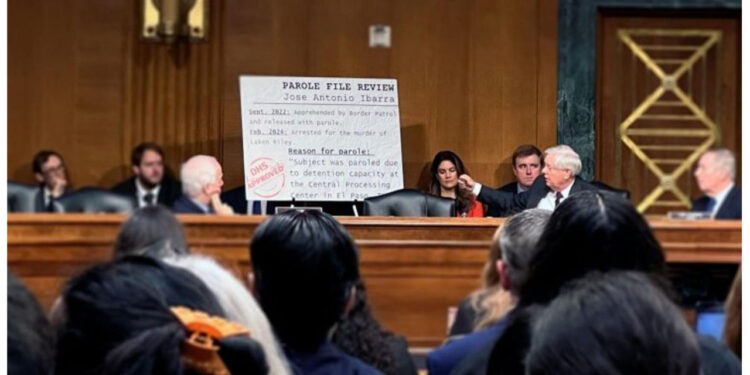Lawmakers were divided Wednesday on the necessity for legal protections for Dreamers, who are noncitizens imported to the United States as children, with Republican senators claiming that legalization cannot be debated until the Biden immigration issue is resolved.
Sen. Lindsey Graham, R-S.C., the leading member of the Senate Judiciary Committee, said that supporting illegal Americans is not his top priority right now. Graham, together with Committee Chairman Dick Durbin, D-Ill., submitted the most recent version of the DREAM Act in 2023.
“Since we started this discussion, the last three years have been a complete and utter disaster for American immigration policy,” Graham stated. “I don’t ever see anything on the DREAM Act coming anytime soon, until we stop the abuse of parole and some underlying problems.”
Republicans argue that legalizing noncitizens would increase and encourage illegal immigration.
“If we do start legalizing people now, I think you are sending a signal to keep coming,” Graham stated. “Is there any end to this, where people brought up by their parents wind up staying and becoming citizens?”
Sen. Marsha Blackburn, R-Tennessee, questioned the legalization of noncitizens, given DACA recipients’ recent access to inexpensive healthcare.
Jessica Vaughan, director of policy studies at the Center for Immigration Studies, believes it would send a message encouraging illegal immigration.
Durbin, on the other hand, supported DACA, claiming that it only applies to people who arrived in the United States before the age of 16 and have lived here continuously since 2007.
He stressed that the DREAM Act, which applies to those who entered the United States as adolescents and have been physically present in the nation for four years, does not provide noncitizens with any privileges other than legal status.
“Let’s not have these people responsible for all the immigration issues,” he stated.
Furthermore, Tom Wong, director of the University of California-San Diego’s U.S. Immigration Policy Center, believes that establishing a path to citizenship for Dreamers would considerably benefit the American economy.
He stressed that undocumented young people currently contribute to the labor market, but legalization would result in increased employment and income, adding $2.5 billion per year in additional state and local tax revenue, according to conservative projections.
Sen. Mazie Hirono, D-Hawaii, agreed that DACA recipients benefit the United States, pointing out that every industry in the country, including police departments, needs labor.
“It makes little sense that we are not going to enact legislation that is going to enable the DACA recipients to stay in our country,” Hirono stated.
Mitchell Soto-Rodriguez, a Blue Island (Ill.) Police Department officer and DACA applicant, has pushed the Senate to take action.
She stated that she worked two jobs to pay for her studies and became a police officer after Blue Island Police Chief Geoffery Farr lobbied for the city to amend its policies to allow DACA holders to apply for police positions. Soto-Rodriguez expressed her fear of losing her job and house in the event of DACA elimination.
Maria Gabriela Pacheco, president and CEO of TheDream.US, the biggest college and career success program for undocumented immigrant youth, and a recently naturalized US citizen, emphasized the need for action.
“We can’t wait. This has been an issue for around 20 years. “We need to act now,” she remarked.
Durbin concurred, adding that the Republican attorney general’s continued effort threatens DACA recipients.
“Even if the courts find, as they should, that DACA is lawful, the future administration can try to end the program,” he stated. “We witnessed the former president’s attempt to abolish DACA, and it’s evident that he will make another attempt if given the opportunity.”










